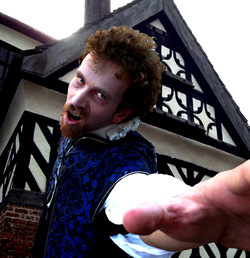Vocalist and lutenist Garald Farnham delighted his audience during his concert presented as part of John O’Brien’s Music House concert series. In his program, titled Passing By… My Life as a Minstrel: An Entertainment for the Parlor, he told the story of his life and artfully intertwined it with a wide range of musical pieces conceived and arranged for voice and lute.
The paper program offered dozens of selections ranging from early English lute songs to Appalachian folk tunes to contemporary pieces arranged for lute, each neatly categorized by genre. The top of the program also communicated the fact that the concert would be informal and would include “a sampling of songs from the groups below.” (For a sample of the program, click here.)
Farnham’s life story is one of love – love of music, love of peace, and love of soul mate. The story of his early years featured mostly contemporary selections arranged for lute – selections that illuminated his yearning to study music, to make a peaceful statement against war as a conscientious objector, and, of course, to communicate to others through music. These selections included things like “My Heart and Lute” by Sir Henry Bishop and Thomas Moore, “The Times They Are a Changin'” by Bob Dylan, and an unusual arrangement of “Prayer of St. Francis” written by Edward Bonnemere (1921-96), a friend of Farnham’s. This portion of the concert was perhaps the weakest, the reason for which later became apparent. As the concert progressed, the true beauty of Farnham’s resonant, mellow baritone voice became much more apparent. In other words, it took him some time to warm up his voice so it could really sing.
Farnham came into his own when he reached the part of his life that included meeting the woman who would later become his wife. In perhaps the most heartfelt piece of the evening, the anonymous Renaissance piece “Have You Seen But a White Lily Grow,” Farnham’s beautiful pianissimo phrases perfectly stated the depth of his love for his wife Nancy. This part of the concert also included other delightfully-performed Renaissance pieces such as John Dowland’s “Come Again” and Thomas Ford’s “Since First I saw Your Face.” A later piece closely tied to Farnham’s love for his wife, an arrangement of Stephen Sondhiem’s popular “Send in The Clowns,” was performed with a depth of expression similar to “Have You Seen But a White Lily Grow” due to it being one of his adopted daughter’s favorites.
The concert was full of ins and outs including Shakespearean monologues proclaimed with the help of a stick puppet; and solo lute pieces played on either a large 1987 Lawrence Brown lute in E or a small 1999 Michael Schreiner lute in G; and original poetry recitations — all of which kept it lively. An honest assessment must include the fact that there were a number of memory slips, both vocal and instrumental. While these to some degree affected the enjoyment of individual pieces, they did not affect the communication of Farnham’s love for the life he has lived. This was no better put forth than with his final selection, Randall Thompson’s setting of the Robert Frost poem “The Road Not Taken.” The poet’s choice of the road less-traveled perfectly correlates to Farnham’s choice to become a busker, or street musician, rather than a music teacher, the road more often taken.











